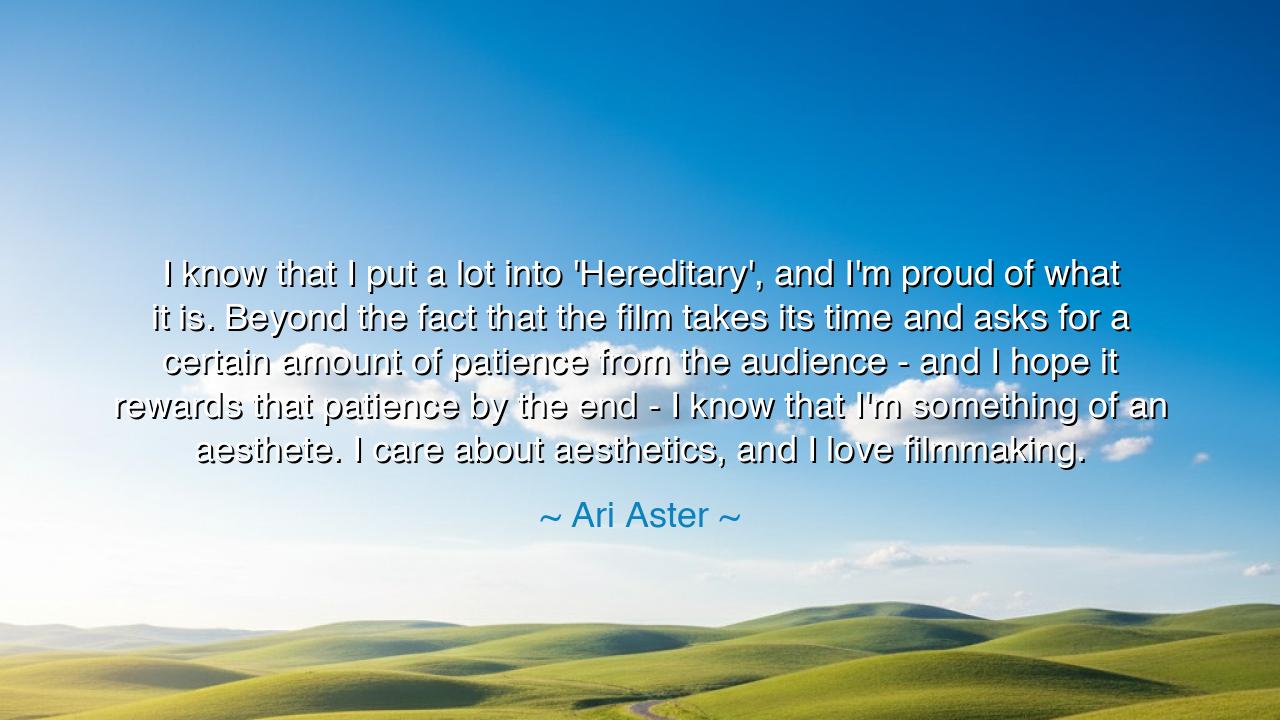
I know that I put a lot into 'Hereditary', and I'm proud of what
I know that I put a lot into 'Hereditary', and I'm proud of what it is. Beyond the fact that the film takes its time and asks for a certain amount of patience from the audience - and I hope it rewards that patience by the end - I know that I'm something of an aesthete. I care about aesthetics, and I love filmmaking.






In the age of modern storytellers, there rose one named Ari Aster, who fashioned a vision both harrowing and sublime in his work called “Hereditary.” Of this labor he declared: “I know that I put a lot into ‘Hereditary’, and I’m proud of what it is. Beyond the fact that the film takes its time and asks for a certain amount of patience from the audience—and I hope it rewards that patience by the end—I know that I’m something of an aesthete. I care about aesthetics, and I love filmmaking.” These words carry not only the weight of an artist reflecting upon his craft, but also a timeless truth about devotion, patience, and the marriage of form and spirit in the creation of art.
For what is an aesthete, if not one who walks the path of beauty as though it were a sacred road? To care for aesthetics is to recognize that truth is not delivered by story alone, but also by how the story is clothed—the light, the sound, the rhythm, the very pulse of the film itself. Aster confesses that his work is not hurried, that it asks of its viewers the noble gift of patience, and in this request he mirrors the ancients, who taught that no great truth is revealed in haste. As the sculptor chips at marble or the monk illuminates his manuscript, so too does the filmmaker labor to shape shadows and silence into revelation.
Let us recall the tale of Michelangelo in the Sistine Chapel. When called to paint, he refused to simply daub the ceiling with figures quickly made. Instead, he wrestled for years with form and vision, asking the people of Rome to wait, asking them to endure their hunger for beauty until the work was done. When at last the ceiling was unveiled, the patience of generations was rewarded with a vision that stirred the soul of all Christendom. In the same spirit, Aster tells us: art that demands patience is art that carries the possibility of deeper reward.
But Aster speaks also of love—the love of filmmaking itself. Here lies another eternal truth: no great creation is born without love. Tools may be mastered, techniques studied, rules obeyed—but if love does not ignite the heart of the creator, the work lies lifeless, like clay unmoved by the breath of spirit. To declare one’s love for the craft is to admit that every frame, every whisper of sound, every pause of silence is an offering not of duty but of devotion. Just as the poet of old poured his soul into song, so the filmmaker pours his heart into the canvas of light and shadow.
Yet in these words is also humility. Aster acknowledges that he is “something of an aesthete,” as though admitting both strength and limitation. He does not claim to be the master of all things, but one who treasures beauty, perhaps to excess. This honesty is itself a teaching: to know oneself, to confess one’s passions and tendencies, is the mark of wisdom. For those who deny their nature are enslaved by it, but those who acknowledge it walk in freedom.
The meaning, then, of Aster’s declaration is twofold: that true art requires patience both from its maker and its beholders, and that true art demands devotion to aesthetics, not as ornament, but as the very vessel of meaning. Just as a seed cannot become a tree without time, so a film cannot reach the depths of the soul without rhythm, form, and beauty. To rush is to cripple the seedling; to neglect beauty is to empty the vessel.
The lesson for us is clear: in our labors, whether they be of art, craft, or daily living, let us walk with patience, and let us care for beauty. Do not demand of life only the swift reward, nor pursue achievement stripped of form. Instead, like Aster, cherish the slow unfolding, honor the aesthetic, and love the process as much as the result. The practical action is this: when you create, linger longer than comfort allows, polish beyond necessity, and invest love into every detail. And when you partake of another’s creation, whether a film, a song, or even a meal, bring patience as your offering, so that beauty may reveal its fullest face.
Thus, Aster’s words stand not only as a reflection on a film, but as a teaching for life: that beauty is worth the wait, that love is the essence of creation, and that those who walk the path of patience and aesthetics will leave behind works that outlive their years and touch generations yet unborn.






AAdministratorAdministrator
Welcome, honored guests. Please leave a comment, we will respond soon